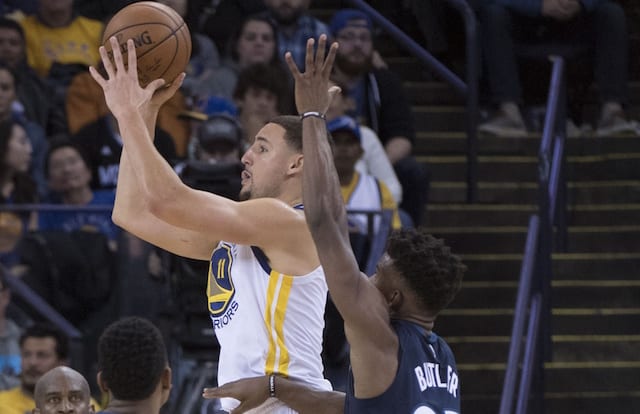Los Angeles Lakers president of basketball operations Magic Johnson and general manager Rob Pelinka methodically created salary cap space for max-contract free agents this summer, and the duo has already gotten a jump for the 2019 NBA free agency class.
That occurred with one fell swoop over the weekend, as the Lakers and Luol Deng came to terms on a buyout. Deng reportedly agreed to give back $7.5 million of his remaining salary in order to be waived via the stretch provision.
Deng will be eligible to sign with any team once he clear waivers, and could find a home and reunion with Tom Thibodeau on the Minnesota Timberwolves. Meanwhile, the Lakers now have just over $38 million in salary cap space for 2019 free agency.
According to ESPN’s Adrian Wojnarowski and Ramona Shelburne, the team has their sights set on Jimmy Butler, Kevin Durant, Kawhi Leonard and Klay Thompson:
The Lakers are targeting the top players in a potentially starry 2019 marketplace, including Toronto’s Kawhi Leonard, Golden State’s Kevin Durant and Klay Thompson and Minnesota’s Jimmy Butler
The Lakers have long been linked to Thompson because his father, Mychal, was a member of the Showtime Era and currently works as one of the team’s radio broadcasters. However, Thompson has been adamant in his desire to remain with the Golden State Warriors.
Leonard was mentioned as a potential option for the Lakers ever since his reported trade request this summer. Butler was recently said to be open to playing in L.A., amid reports of unrest in Minnesota.
Durant might be the longest shot for the Lakers, as he reportedly rejected an overture from LeBron James to join forces this summer. However, the Lakers nonetheless will have the requisite salary cap space to extend Durant (and any player with 10 years of service time) a max-contract offer.
That is due to the front office’s wizardry and awareness to wait until Sept. 1 to formally waive Deng. By doing so, his 2018-19 salary became fully committed. Therefore, the Lakers only stretched Deng’s 2019-20 salary for three years, at $5 million in dead cap each year.





